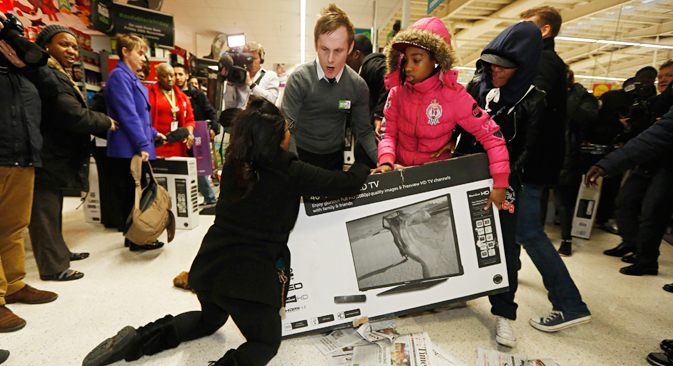
Black Friday in London. Source: Reuters
The British are barbarians. Not a lot of people know that.
Russian readers do, thanks to a slew of stories in Russian newspapers and online news sites about 'Black Friday'.
It's useless trying to claim that Black Friday is an American import. The day when High Street stores across the country offered fantastic discounts on flat screen TVs, 'must have' coffee makers and other consumer tat, witnessed quintessentially British scenes of chaos and greed.
Russian business newspapers Kommersant and Vzglyad both covered the open warfare that erupted as people fought over bargains.
Kommersant took a more dignified approach, something closer to what most Brits prefer to believe is still part of the national character, and merely ran a photograph showing two young women grappling over a boxed flat screen TV with an anxious sales assistant trying to intervene between them.
The photo caption drily noted: "London, Great Britain. Buyers fight over a TV during the Black Friday sale, Asda hypermarket."
Snouts in the trough
Vzglyad took a more adventurous approach, with an online story that included links to two videos, one privately shot on a mobile phone showing shoppers at a supermarket tearing off Black Friday posters covering a pile of the sought-after cut price white goods.
Vzglyad reminds its Russian readers that the video is in English, but many viewers of the clip will surely understand a throwaway comment the video's creator makes:"Pamela, shut up a minute."
It's a remark that sums up the whole sorry tale of a day that witnessed at least one woman injured by a falling TV set and, as Vzglyad noted, the police called to a Tesco supermarket to restore order. "Seven police cars and two ambulances arrived," it said. "No injuries or damages to goods were reported."
Russian readers were not slow to comment on the video footage of Black Friday.
Ilya in Saratov sarcastically remarked: "Democracy in all its glory!)"
Linform in the southern Russian region of Kuban, said the people were "like hungry pigs at a trough into which feed is poured…Ugh."
But commentators to Russian Internet forums should take heed: Black Friday is already part of the Russian retail scene.
There's a special website devoted to the Russian version of the discount day, with advice that British consumers would do well to follow.
"Do not forget you are not alone in aiming for a bargain, so better to see the range [of goods on offer] and decide what you really need and what you can wait for," it sensibly states. The site contains links to all the Russian and international companies, participating in Black Friday, with details of their deals. Perhaps that why, last Friday, there were no reports of disorder in Russian shops.
Poo-powered bus
Many Russians have dubbed it a publicity stunt, but Britain's first poo-powered bus got a lot of coverage from specialist eco-sites like priroda.ru and regular news outlets, such as Kazakhstan's Russian language today.kz
The 40-seater Bath-Bristol Airport A4 bio-bus service may be a bit of a gimmick. Running on methane produced from food and human waste, by regional water and sewage treatment company Wessex Water, the 'fecal bus' as some headlines in Russia dubbed it, is tastefully decorated with an image of men and women sitting on the loo. Fortunately, it is an artist's impression, not a photographic record.
The bus, which can run for 300 km on a single tank of gas, equivalent to the annual bio-waste produced by five people, can help reduce the seven million tonnes of human waste that ends up in landfill sites in Britain every year, priroda.ru reports, although this probably refers to food waste rather than what is flushed down the toilet.
Still, the humorous video the site carries, shows how human and food waste is turned into fuel at a bio-gas plant near Bristol.
The idea certainly caught the imagination of Russian eco-warriors, one remarking that though "British lads are making money out of nothing," he had "always said that landfill in Russia is a poorly understood resource."
He may be missing the point: extracting bio-methane from waste only works in those places where householders use recycling bins, putting their food waste in one plastic tub, glass, plastics, paper in others. Waste recycling of that kind is just beginning to appear on the political agenda in Russia, as Pravda reported last year, in a story on its English-language website headlined "Russia drowns in 60 million tons of garbage a year."
House prices
After such excitement it is pleasing to see that there is one hardy perennial that always comes up smelling of roses.
House prices. It's a national obsession in England and one that is also preoccupying many Russians now as the continuing collapse of the rouble hits property prices.
Finam.ru's story simply notes that the pace of increases in British house prices has slowed.
In a country that has, in the last 30 or 40 years, seen wide variation in house prices with highs followed by lows, such things matter.
Russia, which went from bust after the default of 1998 to boom during much of the past decade, is again skating on thin ice.
That's probably why the financial sites that are spread across the 'Runet' (Russian Internet) like mushrooms after rain, so keenly follow the price of bricks and mortar in Britain, where half of London is owned by Russian oligarchs anyway.
The opinion of the writer may not necessarily reflect the position of RBTH.
All rights reserved by Rossiyskaya Gazeta.
Subscribe
to our newsletter!
Get the week's best stories straight to your inbox